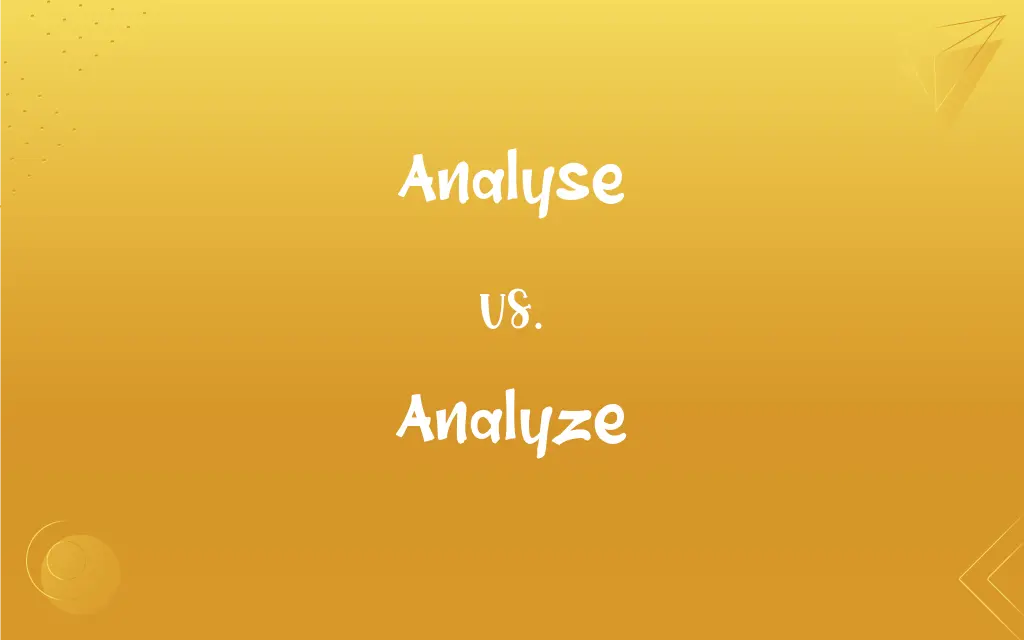Analyse vs. Analyze: What's the Difference?
Edited by Aimie Carlson || By Harlon Moss || Updated on October 21, 2023
Analyse and analyze both mean to examine methodically, but "analyse" is British spelling, while "analyze" is American.

Key Differences
"Analyse" and "analyze" are two spellings of the same verb that pertains to a detailed examination or review.
When one looks at the word "analyse," it predominantly appears in British English writings. On the other hand, "analyze" is the preferred spelling in American English.
Despite their spelling differences, both "analyse" and "analyze" convey the same meaning and function in sentences. They both refer to breaking something down into its components for a thorough understanding.
Interestingly, whether you read a British journal or an American article, the context in which either "analyse" or "analyze" is used remains the same – the methodical and detailed examination of an entity.
Comparison Chart
Spelling
British English
American English
ADVERTISEMENT
Pronunciation
Very similar but can have slight variations depending on regional accents
Typically consistent across American regions
Usage
Seen in UK-based publications, writings, and formal documents
Common in US-based writings, texts, and media
Example Publications
The Guardian, BBC
The New York Times, CNN
Origin
Both derive from Greek "analusis" meaning "a breaking up"
Both derive from Greek "analusis" meaning "a breaking up"
Analyse and Analyze Definitions
Analyse
To break down into components.
She will analyse the composition of the substance.
ADVERTISEMENT
Analyze
To study the elements of something.
She will analyze the novel's themes for her report.
Analyse
To study the structure or function of something.
We need to analyse the building's foundation.
Analyze
To dissect into simpler parts.
Scientists analyze DNA sequences to understand genetics.
Analyse
To diagnose a problem.
The mechanic will analyse the issue with the car.
Analyze
To investigate systematically.
He will analyze the computer system for vulnerabilities.
Analyse
To examine in detail.
I will analyse the data from the survey.
Analyze
To draw conclusions from information.
Analysts often analyze market trends to predict the future.
Analyse
To interpret or infer from data or behavior.
Psychologists analyse human behavior to understand motives.
Analyze
To scrutinize carefully.
I will analyze the results tomorrow.
Analyse
Variant of analyze.
Analyze
To examine methodically by separating into parts and studying their interrelations.
Analyze
(Chemistry) To make a chemical analysis of.
FAQs
Which countries typically use "analyse"?
The UK, Australia, New Zealand, and other Commonwealth nations.
Is there a difference in meaning between analyse and analyze?
No, both words mean to examine methodically.
Why are there two different spellings?
"Analyse" is British English spelling, and "analyze" is American English spelling.
In academic writing in the UK, which variant should I use?
Use "analyse" for British academic writing.
Is one spelling more correct than the other?
Neither is more correct; it depends on the intended audience and regional preference.
Are there nouns associated with these verbs?
Yes, "analysis" is the noun form for both, but "analyser" (British) and "analyzer" (American) differ.
In spoken English, will using one variant over the other be noticeable?
In many regions, the difference in pronunciation is minimal, but some people might notice.
If my writing platform doesn't have a style guide, which should I use?
Consider your primary audience. If uncertain, either is acceptable as long as you're consistent.
Are there any other spellings for these words?
These are the main variants, but always adhere to the style guide of your writing platform.
Are there similar British vs. American spelling differences?
Yes, like "colour" (British) vs. "color" (American).
Do these words only refer to scientific examination?
No, they can be used in various contexts, from literature to psychology.
Can I use "analyse" in American writings?
While understood, "analyze" is the preferred American spelling.
Are the pronunciations of analyse and analyze different?
They're very similar, but regional accents might introduce slight variations.
Are there derivatives of these words with similar spelling differences?
Yes, such as "analyser" (British) and "analyzer" (American).
Do both words come from the same origin?
Yes, both derive from the Greek "analusis," meaning "a breaking up."
In international publications, which spelling is common?
It depends on the publication's style guide, but either may be encountered.
How can I remember which spelling to use?
Think of "analyse" for the UK, like "realise," and "analyze" for the US, like "realize."
Can using the wrong variant affect my writing's professionalism?
It's essential to be consistent and consider your audience; using the wrong variant might be distracting.
Can I interchange the words in a single piece of writing?
For consistency, it's best to stick to one spelling throughout a piece.
In academic writing in the US, which variant should I use?
Use "analyze" for American academic writing.
About Author
Written by
Harlon MossHarlon is a seasoned quality moderator and accomplished content writer for Difference Wiki. An alumnus of the prestigious University of California, he earned his degree in Computer Science. Leveraging his academic background, Harlon brings a meticulous and informed perspective to his work, ensuring content accuracy and excellence.
Edited by
Aimie CarlsonAimie Carlson, holding a master's degree in English literature, is a fervent English language enthusiast. She lends her writing talents to Difference Wiki, a prominent website that specializes in comparisons, offering readers insightful analyses that both captivate and inform.































































